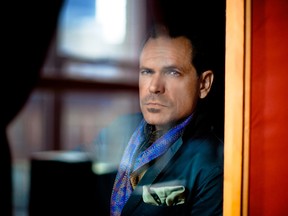Kurt Elling CD reviewed

Reviews and recommendations are unbiased and products are independently selected. Postmedia may earn an affiliate commission from purchases made through links on this page.
Article content
The Questions (Okeh Records / Sony Music Masterworks)
Kurt Elling
If you’ve followed vocalist Kurt Elling over the arc of his 25-year career, you’re no doubt familiar with his exuberant persona and the kinds of songs that he sings so well.
The 50-year-old with the golden pipes can be a larger-than-life performer, both in person and coming out of your headphones. He can win listeners over with powerful and even anthemic versions of jazz standards or classic pop songs, transfixing love songs that you wish you were singing for that special someone, or songs that revel in his mastery of quintessentially cool, bebop-based vocalese. Elling can wed philosophical meditations to music and get away with it.
Elling’s latest studio album The Questions, which was released last week, notably stresses another facet of his artistry — singer of protest songs. The dynamic and dramatically arranged album is front-loaded with rousing pieces in sync with our troubled times, with Elling giving voice soaringly to a progressive person’s conscience.
Opening the album is Bob Dylan’s 1962 protest song A Hard Rain Is Gonna Fall, which proves to be only more relevant in 2018. Elling’s rendition begins with his bravura a cappella delivery of the bulk of the song’s first verse, before an ominous drone accompanies him. With the song’s refrain, Elling’s potent band enters, and the song corkscrews with energy as Elling’s singing and pianist-arranger Stu Mindeman’s deluxe arrangement ratchet up the passion. Guesting saxophonist Branford Marsalis takes a swinging and then churning turn on soprano and later drummer Jeff Watts give the song its penultimate peak with some tumultuous, tumbling solo.
More gentle and positive is A Happy Thought, which offers reassurances about mortality by setting poet Franz Wright’s words to Mindeman’s grand, rolling, folk-tinged music. Then comes a new version of Paul Simon’s An American Tune, which Elling has already recorded once before. Here is his updated, even more dramatic take, with imagery to make his current concerns even clearer:
In case you didn’t make it to the end of the clip — but, how could you? — let me tell you that its kicker is a mention of the “Action” page at Elling’s website, which leads fans to links where they can donate to such causes as Doctors Without Borders, Refugees Welcome, the American Civil Liberties Union. Mercy Corps and the Southern Poverty Law Center.
The redemptive, intimate response to that track is Elling’s tender version of Peter Gabriel’s Washing of the Water, performed as a duet with Mindeman.
After that, the album returns to less politically charged and more jazz-rooted material. Jaco Pastorius’s Three Views of Secret, re-made, thanks to Elling’s lyrics as A Secret in Three Views has been remade into an epic love song that also allows guitarist John McLean to scorch a bit and Mindeman to testify on organ.
What follows is the more downhearted Leonard Bernstein-penned show tune Lonely Town, which includes pianist Joey Calderazzo and trumpeter Marquis Hill spelling off Elling’s plaintive singing.
Clocking in at nine minutes, the slow and floatingly grooving Endless Lawns is the album’s longest track. For it, Elling’s mixes music by Carla Bley with the poem Winter Stars by Sara Teasdale, which contrasts our earthly ills — ” The world’s heart breaks beneath its wars” — with beauty and permanence in the heavens. Hill receives ample space to add lyricism and even luxury to the proceedings with his gorgeous sound.
Guitarist McLean’s re-imagining of Rodgers and Hammerstein’s I Have Dreamed grows from its smaller-scale introductory verse into a luminous declaration of yearning love, with Marsalis adding an extended, fetching solo.
The Enchantress is a dreamy, Brazilian-tinged ballad with music composed by Calderazzo, who conjures a melancholy mood during his solo. Concluding the album is a Hoagy Carmichael standard that opens with a rhetorical question, Skylark. Elling and guitarist McLean bring the classic song in spaciously, Mindeman shows fine poise during his solo, and Elling’s singing is both moving and virtuosic.
The smooth, highly produced sheen of Elling’s music and the sheer mellifluousness of his voice may lead some detractors to think his aesthetic is too much surface and not enough depth. I disagree, and think that The Questions is the only retort needed to prove that the singer has emotional heft, loads of smarts and even a political stand worth affirming as part of his easy-on-the-ears art.
phum@postmedia.com
twitter.com/peterhum
ottawacitizen.com/jazzblog






Postmedia is committed to maintaining a lively but civil forum for discussion. Please keep comments relevant and respectful. Comments may take up to an hour to appear on the site. You will receive an email if there is a reply to your comment, an update to a thread you follow or if a user you follow comments. Visit our Community Guidelines for more information.